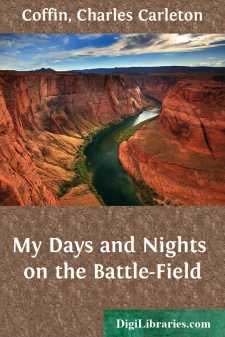Categories
- Antiques & Collectibles 13
- Architecture 36
- Art 48
- Bibles 22
- Biography & Autobiography 813
- Body, Mind & Spirit 142
- Business & Economics 28
- Children's Books 15
- Children's Fiction 12
- Computers 4
- Cooking 94
- Crafts & Hobbies 4
- Drama 346
- Education 46
- Family & Relationships 57
- Fiction 11828
- Games 19
- Gardening 17
- Health & Fitness 34
- History 1377
- House & Home 1
- Humor 147
- Juvenile Fiction 1873
- Juvenile Nonfiction 202
- Language Arts & Disciplines 88
- Law 16
- Literary Collections 686
- Literary Criticism 179
- Mathematics 13
- Medical 41
- Music 40
- Nature 179
- Non-Classifiable 1768
- Performing Arts 7
- Periodicals 1453
- Philosophy 64
- Photography 2
- Poetry 896
- Political Science 203
- Psychology 42
- Reference 154
- Religion 513
- Science 126
- Self-Help 84
- Social Science 81
- Sports & Recreation 34
- Study Aids 3
- Technology & Engineering 59
- Transportation 23
- Travel 463
- True Crime 29
My Days and Nights on the Battle-Field
Categories:
Description:
Excerpt
CHAPTER I.
HOW THE REBELLION CAME ABOUT.
Many of you, my young readers, have seen the springs which form the trickling rivulets upon the hillsides. How small they are. You can almost drink them dry. But in the valley the silver threads become a brook, which widens to a river rolling to the far-off ocean. So is it with the ever-flowing stream of time. The things which were of small account a hundred years ago are powerful forces to-day. Great events do not usually result from one cause, but from many causes. To ascertain how the rebellion came about, let us read history.
Nearly three hundred years ago, when Elizabeth was Queen of England, Sir Walter Raleigh sailed across the Atlantic Ocean to explore the newly discovered Continent of America. Sir Walter was a sailor, a soldier, and one of the gentleman attendants of the Queen. He was so courteous and gallant that he once threw his gold-laced scarlet cloak upon the ground for a mat, that the Queen might not step her royal foot in the mud. At that time America was an unexplored wilderness. The old navigators had sailed along the coasts, but the smooth waters of the great lakes and rivers had never been ruffled by the oars of European boatmen.
Sir Walter found a beautiful land, shaded by grand old forests; also fertile fields, waving with corn and a broad-leaved plant with purple flowers, which the Indians smoked in pipes of flint and vermilion stone brought from the cliffs of the great Missouri River.
The sailors learned to smoke, and when Sir Walter returned to England they puffed their pipes in the streets. The people were amazed, and wondered if the sailors were on fire. So tobacco began to be used in England. That was in 1584. We shall see that a little tobacco-smoke whiffed nearly three hundred years ago has had an influence in bringing about the rebellion.
Twenty years rolled by. London merchants dreamed of wealth in store for them in Virginia. A company was formed to colonize the country. Many of the merchants had spendthrift sons, who were also idle and given to bad habits. These young fellows thought it degrading to work. In those Western woods across the ocean, along the great rivers and upon the blue mountains, they saw in imagination a wild, roving, reckless life. They could hunt the wild beasts. They could live without the restraints of society. They had heard wonderful stories of exhaustless mines of gold and silver. There they could get rich, and that was the land for them.
A vessel with five hundred colonists was fitted out. There were only sixteen men of the five hundred accustomed to work; the others called themselves gentlemen and cavaliers. They settled at Jamestown. They found no rich gold-mines, and wealth was not to be had on the fertile plains without labor. Not knowing how to cultivate the soil, and hating work, they had a hard time. They suffered for want of food. Many died from starvation. Yet more of the same indolent class joined the colony,—young men who had had rows with tutors at school, and who had broken the heads of London watchmen in their midnight revels. A historian of those times says that “they were fitter to breed a riot than found a colony.”
The merchants, finding that a different class of men was needed to save the colony from ruin, sent over poor laboring men, who were apprenticed to their sons. Thus the idle cavaliers were kept from starvation. Instead of working themselves, they directed the poor, hard-working men, and pocketed the profits.
Smoking began to be fashionable in England. Lawyers in big wigs, ministers in black gowns, merchants seated in their counting-houses, ladies in silks and satins, all took to this habit of the North American Indians. Tobacco was in demand. Every ship from America was freighted with it. The purple-flowered plant grew luxuriantly in the fields of Virginia, and so through the labor of the poor men the indolent cavaliers became rich.
As there were no women in the colony, some of the cavaliers sent over to England and bought themselves wives, paying a hundred pounds of tobacco for a wife....




